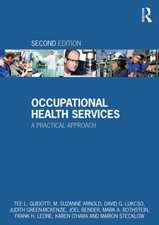Cumulative Trauma Disorders: Current Issues and Ergonomic Solutions
Autor Kathryn G. Parkeren Limba Engleză Paperback – 2 dec 2019
Cumulative Trauma Disorders also explains many of the programmatic features included in the OSHA Ergonomic Guidelines for the Red Meat Industry, which OSHA uses as a means to structure their regulatory activities. This book discusses the rationale and value of implementing program components in the OSHA guidelines as they pertain to the production environment, presenting technical information in a clear, easy-to-read format.
Cumulative Trauma Disorders is an essential book for managers of workers' compensation costs, plant nurses, safety and health technicians and managers, and ergonomic consultants.
| Toate formatele și edițiile | Preț | Express |
|---|---|---|
| Paperback (1) | 352.95 lei 6-8 săpt. | |
| CRC Press – 2 dec 2019 | 352.95 lei 6-8 săpt. | |
| Hardback (1) | 1926.81 lei 6-8 săpt. | |
| CRC Press – 21 iul 1992 | 1926.81 lei 6-8 săpt. |
Preț: 352.95 lei
Preț vechi: 454.60 lei
-22% Nou
Puncte Express: 529
Preț estimativ în valută:
67.54€ • 70.66$ • 56.10£
67.54€ • 70.66$ • 56.10£
Carte tipărită la comandă
Livrare economică 03-17 aprilie
Preluare comenzi: 021 569.72.76
Specificații
ISBN-13: 9780367450267
ISBN-10: 0367450267
Pagini: 160
Dimensiuni: 156 x 234 mm
Greutate: 0.45 kg
Ediția:1
Editura: CRC Press
Colecția CRC Press
ISBN-10: 0367450267
Pagini: 160
Dimensiuni: 156 x 234 mm
Greutate: 0.45 kg
Ediția:1
Editura: CRC Press
Colecția CRC Press
Public țintă
Academic, Professional, and Professional Practice & DevelopmentCuprins
Introduction Part I: Causation of Cumulative Trauma Disorders 1. Body Tissues and Fatigue 2. Workplace Factors 3. The Disorders and Their Etiology Part II: Solutions to a Multifaceted Problem 4. The Basic Intervention Philosophy 5. Ergonomics for Prevention 6. Effective Occupational Medicine for Control 7. Minimizing Lost Time
Descriere
This book offers a discussion of current knowledge and experience in the etiology of cumulative trauma disorders (CTDs) and associated workplace factors, and suggests an approach for control of CTDs in a working environment to assist ergonomists and medical care providers.






